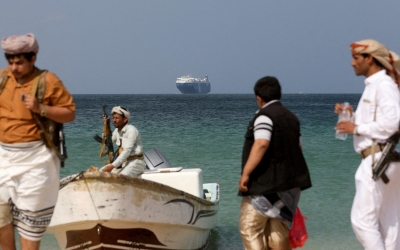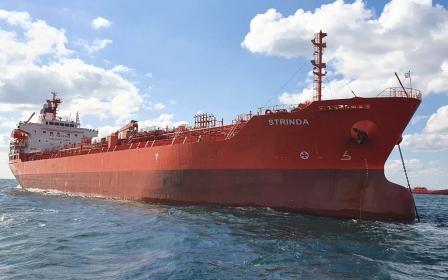US launches fresh strikes on Houthis as Red Sea tensions boil over

The US launched fresh strikes against the Houthis on Tuesday, and the Iran-aligned group claimed responsibility for a missile attack on a cargo ship in the Red Sea, raising tensions in the strategic waterway to new heights.
The US said the strikes targeted four anti-ship ballistic missiles that the Houthis were preparing to launch at commercial vessels in the Red Sea.
With the strikes, the US showed it is willing to deepen its military activity in Yemen. Last week, the US and UK struck more than 60 targets in Yemen, in what they said was an effort to deter the Houthis from launching maritime attacks.
The Houthis say they are attacking what they consider to be Israeli-linked ships in solidarity with Palestinians in Gaza since the war there started on 7 October. But increasingly, many of the ships that have been hit appear to have little connection to Israel.
The US said last week's strikes successfully targeted radar systems, air defence systems, and storage and launch sites for unmanned aerial vehicles (UAVs), cruise missiles, and ballistic missiles.
Stay informed with MEE's newsletters
Sign up to get the latest alerts, insights and analysis, starting with Turkey Unpacked
But US officials cautioned that they only destroyed about 20 to 30 percent of the Houthis’ offensive capabilities.
Meanwhile, the Houthis appear to relish taking on the US as an enemy and have shown little willingness to stop their maritime attacks.
'Solidarity with Palestine'
On Tuesday, they claimed responsibility for a missile strike on the Zografia, a Malta-flagged, Greek-owned bulk carrier. Greek media reported that the ship and its 24 crew members were sailing from Vietnam to Israel without cargo.
The Houthis' spokesperson, Yahya Sarea, said the Zografia was travelling to “occupied Palestine” and that the group would continue its attacks in “solidarity with the wronged Palestinian people”.
The war in Gaza has thrust the Houthis into the international spotlight. They have pulled ahead of Iran’s other “axis of resistance groups”, like Lebanon’s Hezbollah or Iraqi militias, by striking at the heart of global trade and commerce.
The Houthis, once a militia based in the northern Saada region, are followers of Zaidism, an offshoot of Shia Islam. In 2014 they swooped down from Yemen’s northwestern mountains and seized Yemen's capital, Sanaa.
Saudi Arabia and a coalition of Arab states intervened in Yemen’s civil war against the Houthis, in a bid to restore the internationally-recognised government.
The Saudi-led coalition launched thousands of air strikes on Yemen which resulted in hundreds of thousands of civilian deaths and a major humanitarian crisis, but they failed to dislodge the group, which now controls about 80 percent of Yemen’s population.
While the Houthis launched drone and missile attacks on Saudi Arabia and the UAE for years, their campaign against international shipping in professed solidarity with Palestine has galvanised the Arab world behind them, giving them unprecedented recognition and support even among their detractors.
Houthis hit car producers
About 12 percent of global trade passes through the Red Sea, including 30 percent of all global container traffic.
The Bab el-Mandab Strait and Suez Canal to the north are particularly important chokepoints for trade between Asia and the West.
Volvo Cars said it has been forced to halt production at its factory in Belgium because of the tensions in the Red Sea, while Tesla has halted manufacturing in Germany.
Tyre manufacturer Michelin has also warned about temporary“stoppages” at its European factories.
Vessels that avoid the Red Sea and ply trade between the East and West have to take the more circuitous route around the Cape of Good Hope in Africa, which can add two weeks to the journey.
The added trip time, which means handsome profits for ship owners, also risks fuelling inflation and driving up prices for consumers.
Shell suspends Red Sea transits
While cargo vessels have diverted en masse from the Red Sea, tankers carrying energy like Liquified Natural Gas (LNG) and oil appeared to be more risk-averse.
About 74 percent of the Red Sea’s total southbound oil traffic is Russian, with a big chunk going to China; while a big chunk of the northbound LNG in the Red Sea is travelling to Europe from Qatar. Given Doha and Moscow’s warm ties to Tehran, experts have told MEE the Houthis were unlikely to target those vessels on purpose.
But as tensions escalate, there are signs that even the flow of energy is being impacted.
On Friday, British maritime security firm Ambrey said that the Houthis mistakenly targeted a tanker carrying Russian oil. And after the US-led strikes on the Houthis, Qatar also paused its shipments of LNG through the Red Sea, according to ship tracking data.
British oil major Shell has also joined BP in suspending all shipments through the Red Sea. Shell CEO Wael Sawan told the Wall Street Journal at the World Economic Forum in Davos, Switzerland, that the decision would mean a five to 10 percent increase in delivery costs.
Brent crude prices rose four percent to $80.5o a barrel after the US-led strikes, but have since retreated. On Tuesday, Brent was trading at $78.26.
Besides the economic impact, the escalating tensions are fuelling concerns that the war in Gaza could spark a wider conflagration in the region between Washington and Tehran.
Leaders in both capitals have carefully calibrated their responses to the war in Gaza, but experts say there is a chance the tit-for-tat attacks could spiral out of control.
The US says there have been at least 130 attacks by Iran-linked groups on US assets in Iraq and Syria since the war in the Gaza Strip erupted. On Sunday, the Houthis shot a cruise missile at a US Navy destroyer.
Underscoring the risk, on Tuesday the US announced it was searching for two Navy Seals who became lost at sea during an operation to seize Iranian-made missile components en route to the Houthis.
Middle East Eye delivers independent and unrivalled coverage and analysis of the Middle East, North Africa and beyond. To learn more about republishing this content and the associated fees, please fill out this form. More about MEE can be found here.






